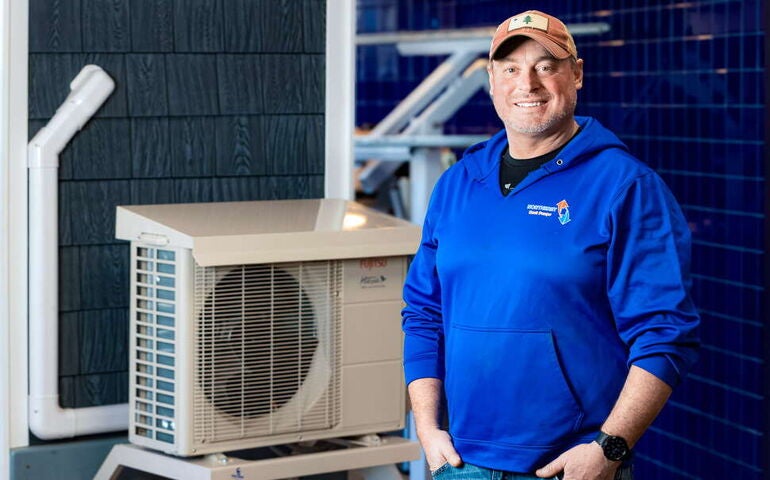Efficiency Maine to leverage strong heat pump market with $15M fed grant
 File PHOTO / TIM GREENWAY
Ryan Keith of Northeast Heat Pumps says heat pump technology pretty much sells itself these days.
File PHOTO / TIM GREENWAY
Ryan Keith of Northeast Heat Pumps says heat pump technology pretty much sells itself these days.
Deploying heat pump technology — across markets that include small businesses, commercial properties, municipalities, homes and schools — is the target of a $15 million grant from the federal government to the Efficiency Maine Green Bank.
The money comes from the U.S. Environmental Protection Agency’s National Clean Investment Fund and will support energy loans.
“These funds will enable the Efficiency Maine Green Bank to offer loans for heat pump projects that will reduce Maine's dependence on imported fuels and lower heating bills in homes and businesses across the state,” said James Neal, Efficiency Maine’s senior manager for finance initiatives.
“These loans will be strategically deployed to complement the pioneering rebate programs offered by Efficiency Maine to help Mainers maintain efficiency and reduce their carbon footprint while staying warm throughout cold Maine winters."
The award comes as air-source heat pumps are gaining traction in Maine.
In 2019, Gov. Janet Mills set a goal to install 100,000 units — in homes, businesses and public buildings — by 2025, along with enhanced rebates through Efficiency Maine and a low-income heat pump program at MaineHousing.
The target was exceeded two years early with 104,000 installations. About half of the goal to install 15,000 heat pumps in low-income households by 2025 was reached by November 2023.
The state’s new target is 175,000 more heat pumps by 2027.
In sync with that goal, the Maine Community College System expanded its heat pump workforce programs with added training lab space, instructors, short-term training programs and heat pump training units in its degree and certificate programs. The system has since trained hundreds of heat pump technicians.
And Efficiency Maine recently redesigned its incentive program to optimize rebates and tax credits. From a couple of million dollars 10 years ago, the rebate program has grown to offer $26 million this year.
Broader market range
Since 2010, Efficiency Maine has offered loans as part of its portfolio of programs to support energy efficiency improvements to businesses and homes.
In recent years, the Maine Legislature has expanded the authority of the Efficiency Maine Green Bank to provide more financing support for the “rapid deployment of mature technologies and the commercialization and scaling of new technologies” that improve energy efficiency and reduce greenhouse gas emissions.
With the latest grant, the Efficiency Maine Green Bank intends to expand its loan and lease offerings across a broader range of small businesses, commercial properties, schools, homeowners and municipalities.
Green banks are a finance model that use public and philanthropic funds to stimulate private investment in renewable energy, energy efficiency and other decarbonization technologies.
Efficiency Maine is a sub-awardee under an application submitted by the Coalition for Green Capital.
The coalition, doing business as the American Green Bank Consortium, is a 501(c)(3) chartered specifically to reduce greenhouse gas emissions and other forms of air pollution and redress climate and energy-related environmental impacts. Since 2011, the coalition has supported or created more than 40 green banks and has developed a pipeline of qualified projects in low-income and disadvantaged communities.
The Efficiency Maine Trust enables a suite of financing offerings for energy projects under one umbrella — the Efficiency Maine Green Bank.
Efficiency Maine Green Bank initiatives are, when possible, designed to drive private capital into market gaps for energy efficiency and clean energy equipment and services.
“Green banks have proven to be instrumental in our transition to a clean energy economy, supporting renewable energy technology investments and deployment across the country,” U.S. Rep. Chellie Pingree, D-Maine 1st District, said in a separate statement.
The EPA’s Greenhouse Gas Reduction Fund is a $27 billion investment to mobilize financing and private capital for greenhouse gas- and air pollution-reducing projects in communities across the country.










0 Comments